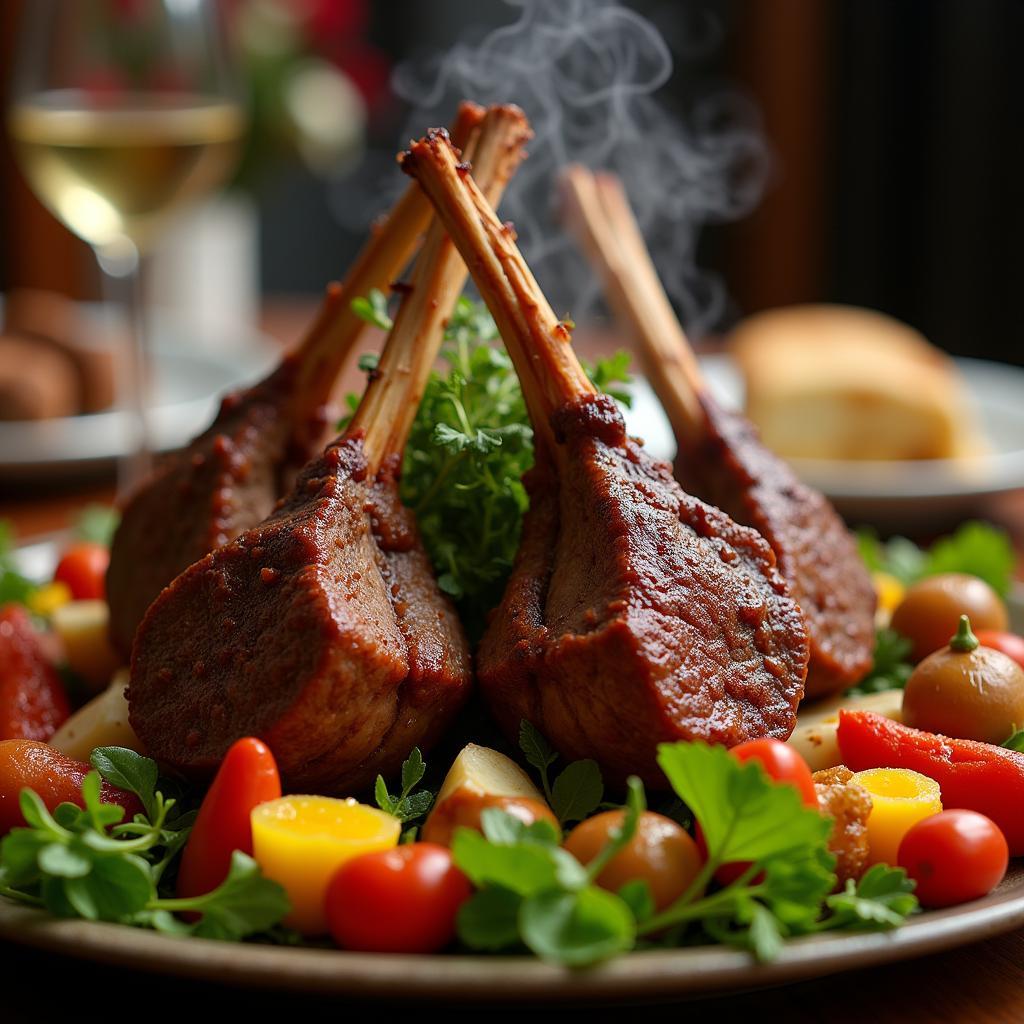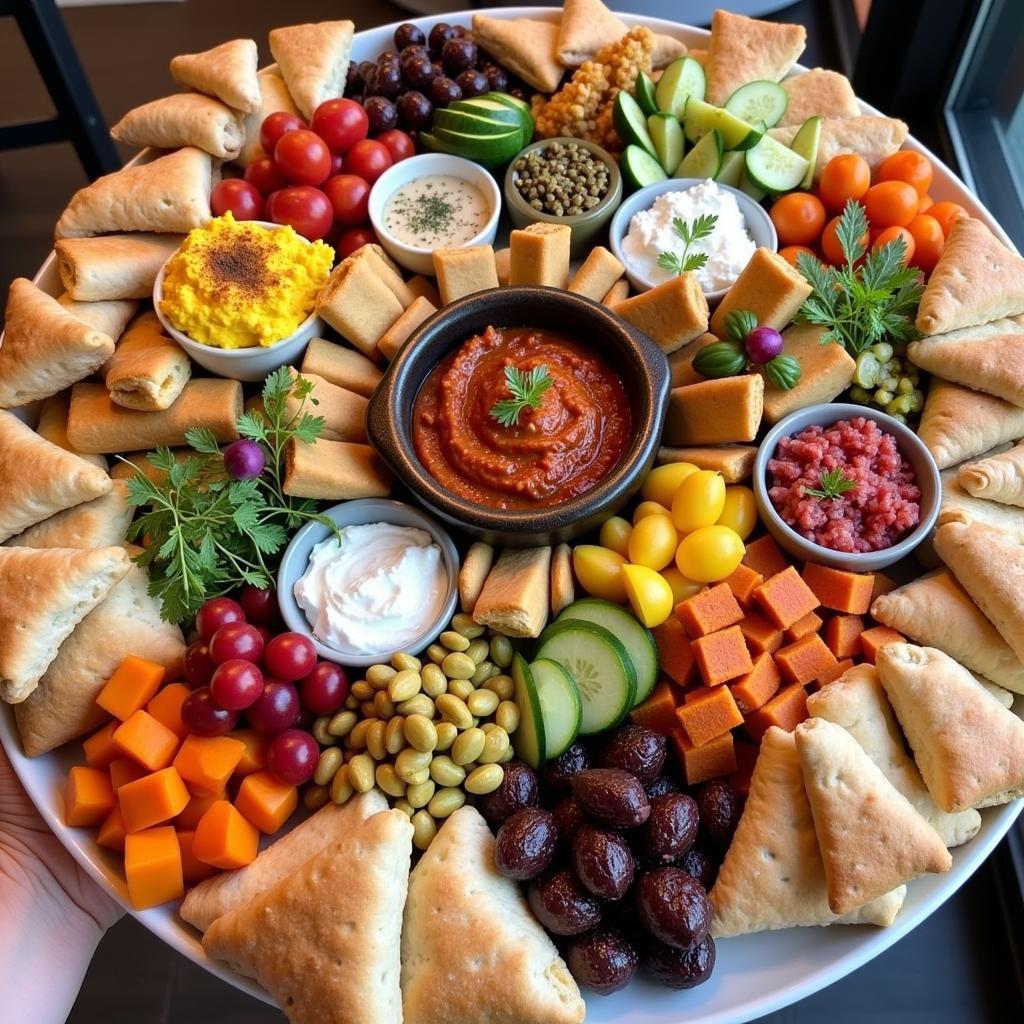Arabic Wedding Food is more than just a meal; it’s a celebration of culture, tradition, and hospitality. From the fragrant spices to the elaborate presentations, arab wedding food offers a sensory experience that leaves a lasting impression. Dive into the rich and diverse world of Arabic wedding cuisine, exploring its regional variations, symbolic dishes, and the art of creating a feast fit for a celebration of love.
The Heart of the Celebration: Traditional Arabic Wedding Dishes
Arabic weddings are renowned for their lavish spreads, showcasing the best of regional cuisines. While specific dishes vary across countries like Morocco, Lebanon, and Egypt, some staples grace almost every table. Expect to find succulent roasted lamb, fragrant rice dishes like biryani or makluba, and an array of colorful salads bursting with fresh herbs and zesty dressings.
 Roasted Lamb at an Arabic Wedding
Roasted Lamb at an Arabic Wedding
These dishes are not just culinary delights; they carry deep cultural significance, symbolizing prosperity, abundance, and the joining of two families. The sharing of food is an integral part of Arabic culture, and wedding feasts are a prime example of this tradition, creating a sense of community and togetherness. For those seeking an authentic culinary experience, consider exploring options like lebanese food catering for your special event.
Regional Variations: A Tapestry of Flavors
The beauty of Arabic wedding food lies in its diversity. Each region boasts unique culinary traditions, adding its own flair to the wedding feast. In Morocco, tagines, slow-cooked stews infused with aromatic spices, are a must-have. Meanwhile, Lebanese weddings often feature mezze, a vibrant selection of small dishes like hummus, baba ghanoush, and tabbouleh, perfect for sharing and socializing.
 Mezze Platter at a Lebanese Wedding
Mezze Platter at a Lebanese Wedding
Egyptian weddings often include kushari, a hearty dish of rice, lentils, macaroni, and chickpeas, topped with a tangy tomato sauce and crispy fried onions. These regional variations reflect the rich tapestry of Arabic culinary heritage, offering a diverse and exciting gastronomic journey for guests.
Sweet Endings: Desserts Fit for Royalty
No Arabic wedding feast is complete without a decadent array of desserts. From the rich, nutty baklava to the creamy, fragrant kunafa, these sweet treats are a testament to the artistry of Arabic pastry making. Often adorned with pistachios, almonds, and rosewater, they provide the perfect culmination to a celebratory meal.
Beyond the Feast: The Art of Presentation and Hospitality
Arabic wedding food is not just about taste; it’s about presentation. Elaborate displays of food, vibrant colors, and intricate garnishes create a feast for the eyes as well as the palate. The generosity and warmth of Arabic hospitality shine through in every aspect of the wedding meal, making guests feel welcomed and cherished. Even something as seemingly simple as choosing the right food coloring, such as liquid whitener food color, can contribute to the overall aesthetic of the dishes.
What are some common Arabic wedding dishes?
Common dishes include roasted lamb, biryani, makluba, and various salads.
What makes Arabic wedding food so special?
It’s a celebration of culture, tradition, and hospitality, with diverse flavors and elaborate presentations.
Are there regional variations in Arabic wedding food?
Yes, each region has unique culinary traditions, from Moroccan tagines to Lebanese mezze.
What types of desserts are typically served at Arabic weddings?
Baklava, kunafa, and other sweet treats adorned with nuts and rosewater are common.
What is the significance of food at Arabic weddings?
Sharing food symbolizes prosperity, abundance, and the joining of two families.
Need help planning your dream Arabic wedding feast? Contact us at 02437655121, email us at minacones@gmail.com, or visit us at 3PGH+8R9, ĐT70A, thôn Trung, Bắc Từ Liêm, Hà Nội, Việt Nam. Our 24/7 customer service team is ready to assist you.